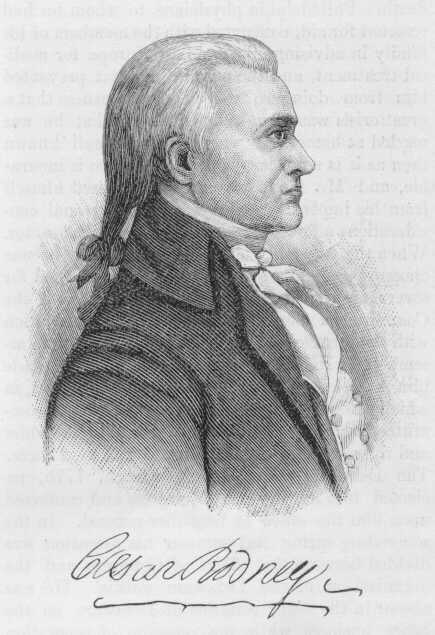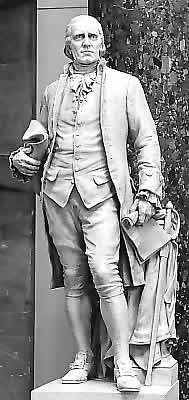Caesar Rodney of Delaware

CAESAR Rodney was born at Dover, in the Province of Delaware, in the year 1730. He was descended from English ancestry. His grandfather came from England soon after William Penn commenced the settlement of Pennsylvania.* After remaining a short time in Philadelphia, and forming acquaintances with some of its most esteemed citizens, he went into the county of Kent, on the Delaware, and settled down upon a plantation. He was an active man, and becoming very popular, he held many posts of honor and distinction in that Province. He had several sons, but lost them all except his youngest, Caesar, the father of the subject of this memoir. Unambitious of public honors, and preferring the quiet of domestic life to the bustle and turmoil of the political field, he declined all offices that were tendered to him ; and in the midst of agricultural pursuits he enriched his mind by study, and prepared his children for the duties of life.
He married the daughter of an esteemed clergyman, and, Caesar being the first born, received their special attention in the matter of education of mind and heart.
On the death of his father, Mr. Rodney as the eldest male heir inherited the paternal estate, and with it, the distinguished consideration with which the family had ever been regarded. There are no records to show at what precise time he appeared in public life, but as he seems to have been a leader in the recorded proceedings of the Legislature of that Province in 1762, it is quite probable that he had done service there some years earlier.
When the Stamp Act excited the jealousy and alarm of the colonies, Mr. Rodney boldly proclaimed his sentiments in opposition to it and several antecedent acts of injustice which the British government had inflicted upon her colonies in America. He acted as well as thought and spoke, and when the "Stamp Act Congress" met in New York, in 1765, Mr. Rodney, together with Mr. M'Kean and Mr. Rollock, was chosen delegate thereto by a unanimous vote.
Mr. Rodney was a member of the Provincial Assembly in 1769, and was chosen its Speaker. He continued a member, and the Speaker of that body until 1774, and as chairman of the corresponding committee, he was arduous in plying his pen in the interchange of political sentiments with his compatriots in other colonies. He was elected a delegate to the General Congress, by a convention of the people of the three counties of Delaware, in Auguss, 1774, and took his seat at the opening of Congress, on the fifth of September following. His colleagues were Thomas M'Kean and George Read, and three more devoted and active men than these could hardly be found. He was one of a committee who drew up a Declaration of Rights and set forth, in an address, the causes for complaint, under which the colonists groaned.
Mr. Rodney was elected a delegate for 1775 and while attending to his duties in Congress, he was appointed Brigadier General of his province. This appointment imposed heavy additional duties upon him, yet he did not shrink from their performance, and he was alternately in Congress and at home, attending at the latter place to the duties of his military station. He was there during the closing debates upon the proposition for a Declaration of Independence in 1776, but was sent for by his colleague, Mr. M'Kean, so as to secure the vote of Delaware for that important measure. He arrived in time to give his voice for independence, and enjoyed the high privilege of signing the revered parchment. On his return to his constituents they approved, by acclamation, of his acts in the National Council.
 This statue of Caesar Rodney was given by Delaware to the National Statuary Hall Collection in 1934.
This statue of Caesar Rodney was given by Delaware to the National Statuary Hall Collection in 1934.In the autumn of 1776, the people of Delaware called a convention to frame a State Constitution, and to elect delegates to the next Congress. Through the machinations of tory members of that convention, whose principles to a great extent leavened it, Mr. Rodney and Mr. M'Kean were not re-elected. But this only tended to increase his ardor, and his pen was constantly busy in correspondence. He was also enabled by this defeat, to attend to his private affairs which had suffered much by his absence.
After the battle of Princeton at the beginning of 1777, in which Colonel Haslet, who belonged to General Rodney's brigade, was killed, the latter immediately started for the army, and meeting Lord Stirling at Philadelphia, received .orders to remain at Princeton, and make it a sort of recruiting station. General Rodney remained there for about two months, when his services became no longer necessary and he returned to his family.
Soon after his return home, he was appointed a judge of the Supreme Court. He, however, declined the honor preferring the more active life of his military station. He was soon afterward called to marshal his brigade to a scene of insurrectionary disorder in Delaware, which he speedily quelled ; and he also joined the main army of Washington when the British under Lord Howe landed at the mouth of the Elk river, and directed their march toward Philadelphia.** Not long after this event, toryism became so much in the minority, that it had but little power to oppose the patriots and General Rodney was again elected to Congress. But the political agitation of his State demanded his presence there, and he remained. He was chosen President of the State, and performed the arduous duties of his office with great faithfulness for about four years. Delaware was peculiarly exposed to the predatory incursions of the enemy, and it required great sagacity and arduous toil for those who managed her affairs, to prevent a state of anarchy.
While thus laboring for his country's good, Mr. Rodney suffered greatly from the effects of a disease (cancer in the cheek) that bad been upon him from his youth, and it made dreadful inroads upon his health. Feeling conscious that he was wasting away, he retired from public life and calmly awaited the summons for departure to the spirit-land. He died early in the year 1783, (June 26 1784) when in the fifty-third year of his age.
* In 1681, William Penn, a member of the Society of Friends, or Quakers, and son of the English Admiral of that name, obtained a grant of Charles II. of all the lands embraced in the present State of Pennsylvania. That region had been colonized by Swedes, nearly forty years before, and Penn issued a proclamation, guarantying to permanent settlers undisputed right to the lands they occupied. The great aim of that good man was to establish an empire in the new world, upon the sacred principles of peace and brotherly love, where men of all nations, creeds, and hues, might live together as one harmonious family. Had the policy of William Penn, in conciliating the Indians by uniform kindness of treatment, been followed in the other colonies, much bloodshed might have been prevented, and the settlements would sooner have become permanent and prosperous. During the entire time that William Penn was proprietor of Pennsylvania, not a single dispute occurred with the natives.
** General Howe, finding it impracticable to reach Philadelphia by land, embarked his troops on board the British fleet, then lying off Sandy Hook, and proceeded to the Chesapeake Bay. His troops were landed at the mouth of Elk River on the twenty-fifth of August, 1777, and that was the first intimation Washing, ton had of his real destination. The British immediately commenced their march toward Philadelphia, and the Americans at the same time marched from that city to meet them. They met upon the river Brandy wine, where the battle of that name, so disastrous to the Americans, occurred. It was there that La Fayette greatly distinguished himself, and was severely wounded.
Text taken from "Biographical Sketches of the Signers of the Declaration of Independence" by BJ Lossing, 1848
Return to Founding Fathers Page
Revolutionary War and Beyond Home
Like This Page?
© 2008 - 2022 Revolutionary-War-and-Beyond.com Dan & Jax Bubis










Facebook Comments